5 books about World music
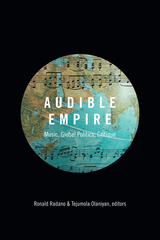
Audible Empire
Music, Global Politics, Critique
Ronald Radano and Tejumola Olaniyan, editors
Duke University Press, 2016
Audible Empire rethinks the processes and mechanisms of empire and shows how musical practice has been crucial to its spread around the globe. Music is a means of comprehending empire as an audible formation, and the contributors highlight how it has been circulated, consumed, and understood through imperial logics. These fifteen interdisciplinary essays cover large swaths of genre, time, politics, and geography, and include topics such as the affective relationship between jazz and cigarettes in interwar China; the sonic landscape of the U.S.– Mexico border; the critiques of post-9/11 U.S. empire by desi rappers; and the role of tonality in the colonization of Africa. Whether focusing on Argentine tango, theorizing anticolonialist sound, or examining the music industry of postapartheid South Africa, the contributors show how the audible has been a central component in the creation of imperialist notions of reason, modernity, and culture. In doing so, they allow us to hear how empire is both made and challenged.
Contributors: Kofi Agawu, Philip V. Bohlman. Michael Denning, Brent Hayes Edwards, Nan Enstad, Andrew Jones, Josh Kun, Morgan Luker, Jairo Moreno, Tejumola Olaniyan, Marc Perry, Ronald Radano, Nitasha Sharma, Micol Seigel, Gavin Steingo, Penny Von Eschen, Amanda Weidman.
Contributors: Kofi Agawu, Philip V. Bohlman. Michael Denning, Brent Hayes Edwards, Nan Enstad, Andrew Jones, Josh Kun, Morgan Luker, Jairo Moreno, Tejumola Olaniyan, Marc Perry, Ronald Radano, Nitasha Sharma, Micol Seigel, Gavin Steingo, Penny Von Eschen, Amanda Weidman.
[more]
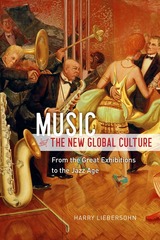
Music and the New Global Culture
From the Great Exhibitions to the Jazz Age
Harry Liebersohn
University of Chicago Press, 2019
Music listeners today can effortlessly flip from K-pop to Ravi Shankar to Amadou & Mariam with a few quick clicks of a mouse. While contemporary globalized musical culture has become ubiquitous and unremarkable, its fascinating origins long predate the internet era. In Music and the New Global Culture, Harry Liebersohn traces the origins of global music to a handful of critical transformations that took place between the mid-nineteenth and early twentieth century. In Britain, the arts and crafts movement inspired a fascination with non-Western music; Germany fostered a scholarly approach to global musical comparison, creating the field we now call ethnomusicology; and the United States provided the technological foundation for the dissemination of a diverse spectrum of musical cultures by launching the phonograph industry. This is not just a story of Western innovation, however: Liebersohn shows musical responses to globalization in diverse areas that include the major metropolises of India and China and remote settlements in South America and the Arctic. By tracing this long history of world music, Liebersohn shows how global movement has forever changed how we hear music—and indeed, how we feel about the world around us.
[more]
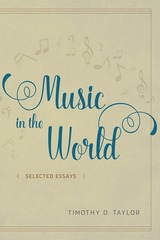
Music in the World
Selected Essays
Timothy D. Taylor
University of Chicago Press, 2017
In music studies, Timothy D. Taylor is known for his insightful essays on music, globalization, and capitalism. Music in the World is a collection of some of Taylor’s most recent writings—essays concerned with questions about music in capitalist cultures, covering a historical span that begins in the late nineteenth and early twentieth centuries and continues to the present. These essays look at shifts in the production, dissemination, advertising, and consumption of music from the industrial capitalism of the nineteenth century to the globalized neoliberal capitalism of the past few decades.
In addition to chapters on music, capitalism, and globalization, Music in the World includes previously unpublished essays on the continuing utility of the concept of culture in the study of music, a historicization of treatments of affect, and an essay on value and music. Taken together, Taylor’s essays chart the changes in different kinds of music in twentieth- and twenty-first-century music and culture from a variety of theoretical perspectives.
In addition to chapters on music, capitalism, and globalization, Music in the World includes previously unpublished essays on the continuing utility of the concept of culture in the study of music, a historicization of treatments of affect, and an essay on value and music. Taken together, Taylor’s essays chart the changes in different kinds of music in twentieth- and twenty-first-century music and culture from a variety of theoretical perspectives.
[more]
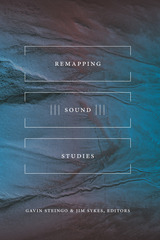
Remapping Sound Studies
Gavin Steingo and Jim Sykes, editors
Duke University Press, 2019
The contributors to Remapping Sound Studies intervene in current trends and practices in sound studies by reorienting the field toward the global South. Attending to disparate aspects of sound in Africa, South and Southeast Asia, Latin America, the Middle East, Micronesia, and a Southern outpost in the global North, this volume broadens the scope of sound studies and challenges some of the field's central presuppositions. The contributors show how approaches to and uses of technology across the global South complicate narratives of technological modernity and how sound-making and listening in diverse global settings unsettle familiar binaries of sacred/secular, private/public, human/nonhuman, male/female, and nature/culture. Exploring a wide range of sonic phenomena and practices, from birdsong in the Marshall Islands to Zulu ululation, the contributors offer diverse ways to remap and decolonize modes of thinking about and listening to sound.
Contributors
Tripta Chandola, Michele Friedner, Louise Meintjes, Jairo Moreno, Ana María Ochoa Gautier, Michael Birenbaum Quintero, Jeff Roy, Jessica Schwartz, Shayna Silverstein, Gavin Steingo, Jim Sykes, Benjamin Tausig, Hervé Tchumkam
Contributors
Tripta Chandola, Michele Friedner, Louise Meintjes, Jairo Moreno, Ana María Ochoa Gautier, Michael Birenbaum Quintero, Jeff Roy, Jessica Schwartz, Shayna Silverstein, Gavin Steingo, Jim Sykes, Benjamin Tausig, Hervé Tchumkam
[more]
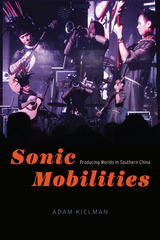
Sonic Mobilities
Producing Worlds in Southern China
Adam Kielman
University of Chicago Press, 2022
A fascinating look at how the popular musical culture of Guangzhou expresses the city’s unique cosmopolitanism.
Guangzhou is a large Chinese city like many others. With a booming economy and abundant job opportunities, it has become a magnet for rural citizens seeking better job prospects as well as global corporations hoping to gain a foothold in one of the world’s largest economies. This openness and energy have led to a thriving popular music scene that is every bit the equal of Beijing’s. But the musical culture of Guangzhou expresses the city’s unique cosmopolitanism. A port city that once played a key role in China’s maritime Silk Road, Guangzhou has long been an international hub. Now, new migrants to the city are incorporating diverse Chinese folk traditions into the musical tapestry.
In Sonic Mobilities, ethnomusicologist Adam Kielman takes a deep dive into Guangzhou's music scene through two bands, Wanju Chuanzhang (Toy Captain) and Mabang (Caravan), that express ties to their rural homelands and small-town roots while forging new cosmopolitan musical connections. These bands make music that captures the intersection of the global and local that has come to define Guangzhou, for example by writing songs with a popular Jamaican reggae beat and lyrics in their distinct regional dialects mostly incomprehensible to their audiences. These bands create a sound both instantly recognizable and totally foreign, international and hyper-local. This juxtaposition, Kielman argues, is an apt expression of the demographic, geographic, and political shifts underway in Guangzhou and across the country. Bridging ethnomusicology, popular music studies, cultural geography, and media studies, Kielman examines the cultural dimensions of shifts in conceptualizations of self, space, publics, and state in a rapidly transforming the People’s Republic of China.
Guangzhou is a large Chinese city like many others. With a booming economy and abundant job opportunities, it has become a magnet for rural citizens seeking better job prospects as well as global corporations hoping to gain a foothold in one of the world’s largest economies. This openness and energy have led to a thriving popular music scene that is every bit the equal of Beijing’s. But the musical culture of Guangzhou expresses the city’s unique cosmopolitanism. A port city that once played a key role in China’s maritime Silk Road, Guangzhou has long been an international hub. Now, new migrants to the city are incorporating diverse Chinese folk traditions into the musical tapestry.
In Sonic Mobilities, ethnomusicologist Adam Kielman takes a deep dive into Guangzhou's music scene through two bands, Wanju Chuanzhang (Toy Captain) and Mabang (Caravan), that express ties to their rural homelands and small-town roots while forging new cosmopolitan musical connections. These bands make music that captures the intersection of the global and local that has come to define Guangzhou, for example by writing songs with a popular Jamaican reggae beat and lyrics in their distinct regional dialects mostly incomprehensible to their audiences. These bands create a sound both instantly recognizable and totally foreign, international and hyper-local. This juxtaposition, Kielman argues, is an apt expression of the demographic, geographic, and political shifts underway in Guangzhou and across the country. Bridging ethnomusicology, popular music studies, cultural geography, and media studies, Kielman examines the cultural dimensions of shifts in conceptualizations of self, space, publics, and state in a rapidly transforming the People’s Republic of China.
[more]
READERS
Browse our collection.
PUBLISHERS
See BiblioVault's publisher services.
STUDENT SERVICES
Files for college accessibility offices.
UChicago Accessibility Resources
home | accessibility | search | about | contact us
BiblioVault ® 2001 - 2024
The University of Chicago Press









